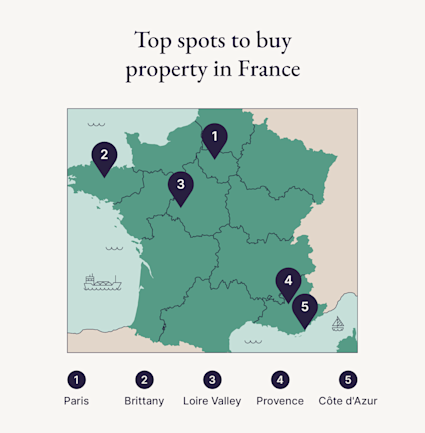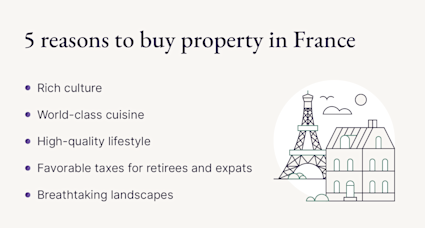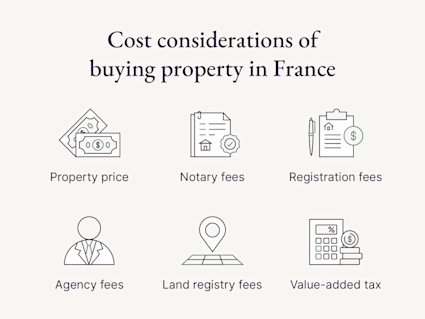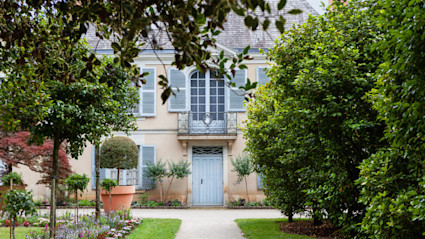
1. Pick a region
There are many French regions to explore, each with its own unique charms. From busy cities to the serene countryside, here are a few popular regions for real estate in France:- Provence: Known for its sun-drenched landscapes, lavender fields and picturesque villages, Provence offers a laid-back lifestyle and stunning views.
- Côte d'Azur: A glamorous coastline with world-class beaches, chic towns and vibrant nightlife, the Côte d'Azur is perfect for those seeking luxury and excitement.
- Loire Valley: A region with stunning chateaus and picturesque river towns, the Loire Valley is ideal for wine lovers and history buffs.
- Brittany: A rugged coastal region with charming seaside towns and ancient Celtic traditions, Brittany offers a unique and authentic experience.
2. Find the right house
Once you've chosen your dream region, the next step is to find the perfect French property. Consider your budget, desired lifestyle and long-term plans when selecting a home. Whether you're looking for a cozy apartment, a spacious family home or you want to buy your first vacation retreat, France has it.To find the right property, you can explore listings online or work with a local real estate agent. For a hassle-free way to buy a second home in France, consider owning a Pacaso second home. Pacaso simplifies the entire process, from property acquisition to management, allowing you to own a piece of France without the complexities of traditional foreign property ownership.| Tip: Use a property search tool like Pacaso to efficiently filter properties based on your budget, location and desired property type. This can save you time and help you find your French dream home faster. |
3. Make an offer
Once you’ve found the ideal French property, it’s time to make an offer. The process in France can vary but generally involves submitting a written offer to the seller’s real estate agent. Your offer should include the purchase price, any contingencies like financing or property inspections and a proposed closing date. Be aware of local customs and negotiation tactics when buying a house in France. A local real estate agent can guide you or Pacaso’s process can make ownership of French property even simpler.4. Do your due diligence
Once your offer is accepted, be sure to conduct thorough due diligence to ensure a smooth transaction. This involves hiring a French notary who will handle the legal aspects of the purchase. The notary will draft a compromis de vente, a preliminary sales agreement outlining the sale terms.It’s wise to meet with a French attorney to review the compromis de vente and protect your interests when buying a home in France. The attorney can help you understand the legal implications, negotiate terms and identify any potential risks.5. Get financing
Securing financing for a foreign property can be complex. Traditional lenders may have specific requirements and limitations for international real estate purchases. To simplify the process, consider working with a company like Pacaso. They can handle the financing aspect of buying a property abroad, making it easier for you to acquire a second home in France.If you plan to explore traditional financing options, research international mortgage lenders specializing in French property. Be prepared to provide additional documentation, such as proof of income and assets, to qualify for a loan.| Tip: Consider working with a company like Pacaso, which offers innovative financing solutions to help you acquire a second home in France. This can simplify the process and make it more accessible. |
6. Pay a deposit
After the compromis de vente is signed, you'll typically need to pay a deposit to the seller. The deposit amount varies, but it's usually a percentage of the purchase price, often around 10%. This deposit secures the deal and shows your commitment to the purchase.Keep in mind that this deposit is usually non-refundable, so make sure you’re confident in your decision before signing the compromis de vente.7. Transfer ownership
Once all the necessary paperwork is completed, the final step is to transfer ownership of the property to your name, a process known as mutation de propriété. This involves signing the acte authentique, the final legal document that transfers ownership.After signing the acte authentique, the notary will register the property in your name at the land registry office. This process can take some time, but once it's complete, you'll officially be the owner of your French property.| Tip: After the transfer of ownership, ensure you update your insurance policy to cover your new French property. |

Why buy real estate in France
Co-owning a second home in France allows you to experience a rich new culture, savor world-class cuisine and enjoy a high quality of life at a home away from home.Can Americans buy property in France?
Yes, Americans can buy property in France. While there are certain legal and tax considerations to be aware of, buying real estate in France as a foreigner is permitted. It's wise to work with qualified professionals, such as a French notary and an attorney, to ensure compliance with all regulations as you walk through the buying process.
How much does it cost to buy French properties?
The cost of buying a property in France depends on the region, property type and size. Here's a breakdown of the factors influencing overall cost:Average price of properties in France
Properties in popular regions like Paris, Lyon and Bordeaux tend to be more expensive than those in less sought-after areas. In 2024, the square meter price of a house in Paris was, on average, 9,895 euros, with some as high as 15,000 euros, depending on the arrondissement.Taxes and fees
In addition to the purchase price, there are various taxes and fees associated with buying a home in France:- Notary fees: These fees cover the legal work involved with the transaction, typically ranging from 2% to 8% of the purchase price.
- Registration fees: These government fees are calculated based on the property's value, ranging from 3% to 8%.
- Agency fees: If you're working with a real estate agent, you'll likely need to pay an agency fee, usually around 3% to 10% of the purchase price.
- Land registry: These fees are charged for registering the property in your name and typically cost a few hundred euros.
- Value-added tax (VAT): While not applicable to most residential property purchases, VAT may be charged on new properties or certain types of renovations.
French real estate scams to avoid
While owning property in France can be a rewarding experience, you should also be aware of common real estate scams. Watch out for:- Fraudulent sellers: Be cautious of sellers who pressure you to make quick decisions or offer deals that seem too good to be true. Always verify the seller's identity and property ownership through a reputable source.
- Advanced payment scams: Never wire money or make large payments upfront, especially to people you haven't met in person. Always use secure payment methods before transferring funds.
- Phishing scams: Be wary of unsolicited emails or phone calls requesting personal information or financial details during the home buying process. Never click on links or open attachments from unknown sources, and always verify the sender's identity before responding.
Make buying property in France easy with Pacaso
By following these steps, you can successfully navigate how to buy a house in France. If you’re not ready to commit to a full-time move, consider co-owning a Pacaso second home. When you co-own a vacation home, you can simplify the home buying process and enjoy hassle-free ownership of your French property.Buying property in France FAQ
01: Do I need a French bank account to buy a house in France?
No, you don’t need a French bank account to buy a house in France. However, it can simplify the process of managing your property and paying local taxes and utility bills once you move.
02: Can Americans get a French mortgage?
Yes, Americans can get a French mortgage, but as a foreigner you may need to pay a higher deposit to secure a mortgage. It’s best to consult with a mortgage broker who specializes in international loans to explore your options.
03: What are the risks of buying property in France
As with any real estate purchase, there are risks involved in buying property in France. These can include market fluctuations, potential rental income instability and changes in tax laws. Be sure to thoroughly research your purchase and consult with local experts to mitigate these risks.
04: Should you buy or rent property in France?
The decision to buy or rent property in France depends on your personal preferences, budget and long-term goals. If you want to spend significant time in France, buying property can be a worthwhile option. However, if you’re looking for something more flexible, renting might be a better choice. Alternatively, co-owning a second home with Pacaso offers a hassle-free way to own a piece of France without the full financial burden and management responsibilities.


